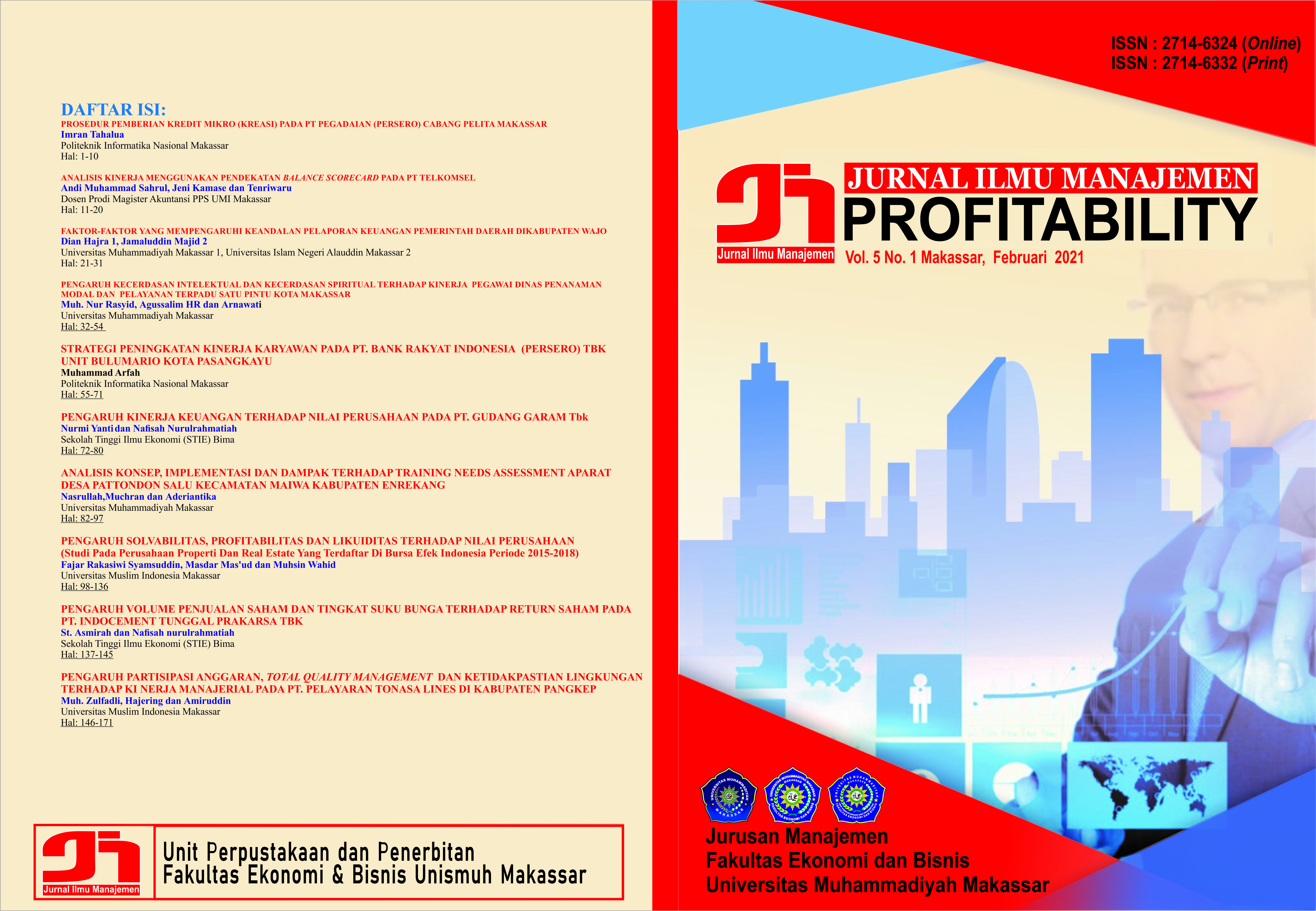THE EFFECT OF INTELLECTUAL INTELLECTUAL AND SPIRITUAL INTELLIGENCE ON THE PERFORMANCE OF EMPLOYEES IN THE CAPITAL INVESTMENT SERVICE AND INTEGRATED SERVICES IN MAKASSAR CITY
DOI:
https://doi.org/10.26618/profitability.v5i1.4855Keywords:
Intellectual Intelligence, Spiritual Intelligence and Employee PerformanceAbstract
This study aims to determine and analyze the Effects of Intellectual Intelligence and Spiritual Intelligence on the Performance of Employees of the Makassar City Investment and Integrated Service Office. Data analysis using multiple regression equations and the classic assumption test, one of the methods used to determine the number of samples is using the Slovin formula, the sample used was 50 employees. The research data was obtained from questionnaires, literature studies, and direct interviews with relevant parties according to the research objectives. From the results of multiple regression testing, data showing the variable Intellectual Intelligence and Spiritual Intelligence have a positive effect by looking at the F test value of 65.950, thus F arithmetic> F table (> 0.05), For the t value of the intellectuality variable of 0.179 and the significance value of 0.112 > 0.05 so that the variable Intellectual Intelligence has a positive and insignificant effect, while the Spiritual Intelligence variable of 0,000 <0.05 so the more positive and significant effect on employee performance is the Spiritual Intelligence variableReferences
Annastasi, Anne, and Susana Urbina. “Tes Psikologi”. Jakarta: PT. Indeks, 2014.
Armansyah. “Intelligent Quotient, Emotional Quotient, dan Spiritual Quotient Dalam Membentuk Perilaku Kerja”. Jurnal Ekonomi dan Bisnis, 2013.
Arikunto, S. 2012. Prosedur penelitian Suatu Pendekatan Praktek. Edisi Revisi 6. Jakarta: PT. Rineka Cipta.
Ayu, Tirta Sati. 2018. “Pengaruh Kecerdasan Intelektual, Kecerdasan Emosional dan Kecerdasan Spiritual Terhadap Kinerja Karyawan”. Skripsi, Jakarta: Universitas Islam negeri Syarif Hidayatullah, Jakarta, 2018.
Eysenck, H.J., and L Kamin. “Intelligence: The Battle For The Mind”. London and Sidney: Pan Book, 2014.
Hasibuan, Malayu. “Manajemen Sumber Daya Manusia”. Jakarta: PT. Bumi Aksara, 2014.
https://makassar.rakyatku.com/post/ini-tujuan-terbentuknya-dpm-ptsp-kota-makassar.html
https://rudijunti20.blogspot.com/2016/12/dimensi-spiritual-dan-intelektual.html?m=1
Mangkunegara,A.A,Anwar Prabu, 2013, Manajemen Sumber Daya Manusia Perusahaan, Cetakan kesebelas, Rosda, Bandung.
Pangestu, Dwijayanti. “Pengaruh Kecerdasan Intelektual, Kecerdasan Emosional dan Kecerdasan Sosial Terhadap Pemahaman Akuntansi”. Skripsi. Universitas Pembangunan Nasional Veteran, Jakarta, 2016.
Purwanto, Ngalim. “ilmu Pendidikan Teoritis dan Praktis”. Bandung: Remaja Rosda Karya, 2013.
Robbins, Stephen P. ”Perilaku Organisasi”. Vol. Jilid II. Jakarta: PT. Indeks, 2015.
Sedarmayanti. ”Sumber Daya Manusia dan produktivitas Kerja”. Bandung: CV. Mandar Maju, 2015.
Downloads
Published
Issue
Section
License
Authors who publish with Jurnal Ilmu Manajemen Profitability agree to the following terms:
Copyright of the articles remains with the authors.
Authors grant the journal the right of first publication with the work simultaneously licensed under a Creative Commons Attribution-NonCommercial 4.0 International License (CC BY-NC 4.0). This license allows others to:
Share (copy and redistribute the material in any medium or format)
Adapt (remix, transform, and build upon the material)
as long as they give appropriate credit to the original author(s) and source, provide a link to the license, and indicate if changes were made. Non-commercial use only.
Authors are permitted to:
Distribute their published work (e.g., post it to an institutional repository or publish it in a book), with an acknowledgment of its initial publication in this journal.
Enter into separate, additional contractual arrangements for the non-exclusive distribution of the journal’s published version of the work (e.g., post it to a class website or institutional archive).
For permissions to use the content published in this journal beyond the scope of the license (e.g., commercial purposes), please contact the editorial office via the journal email.
License Details:
This journal is licensed under a Creative Commons Attribution-NonCommercial 4.0 International License (CC BY-NC 4.0).

